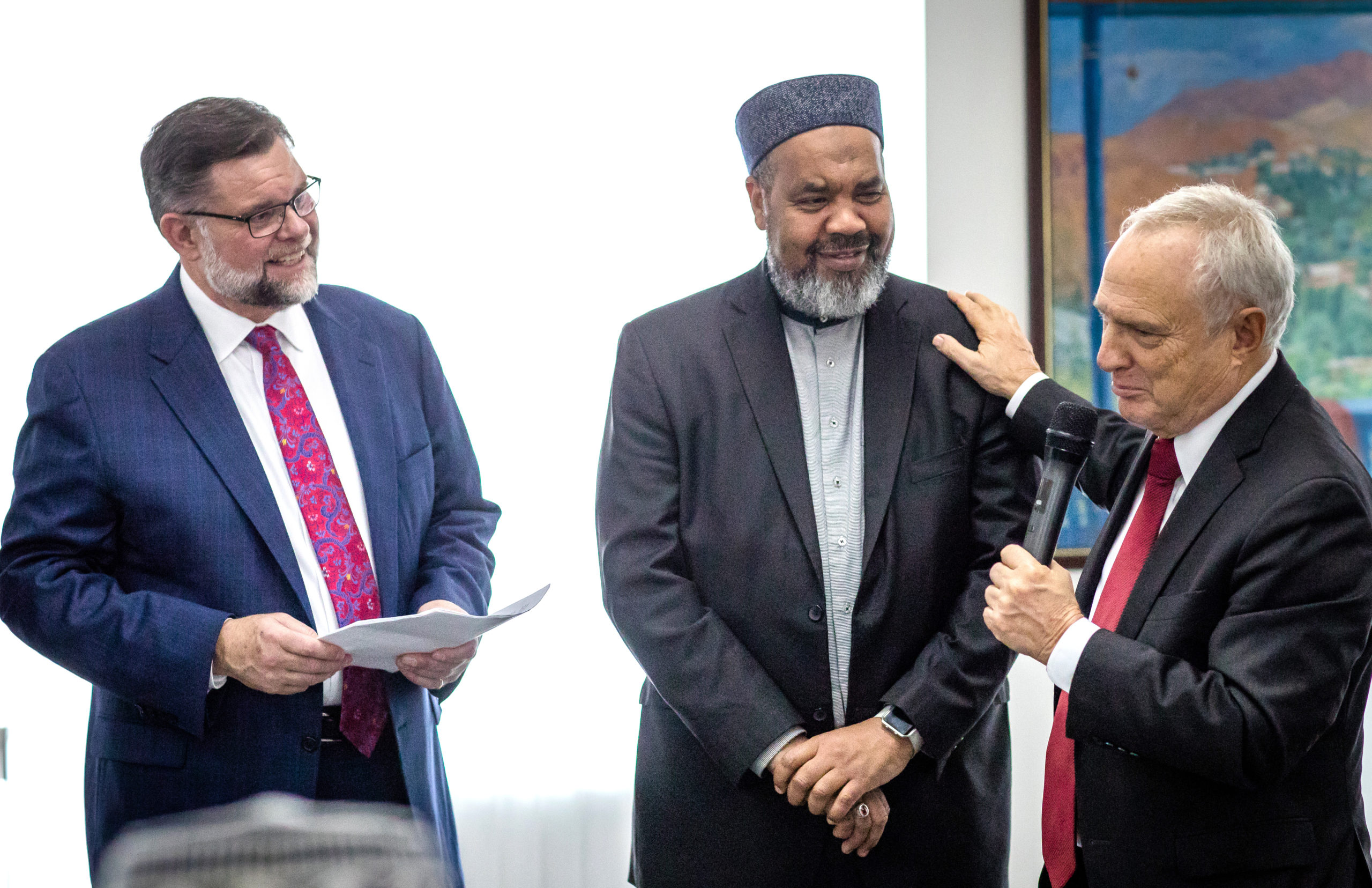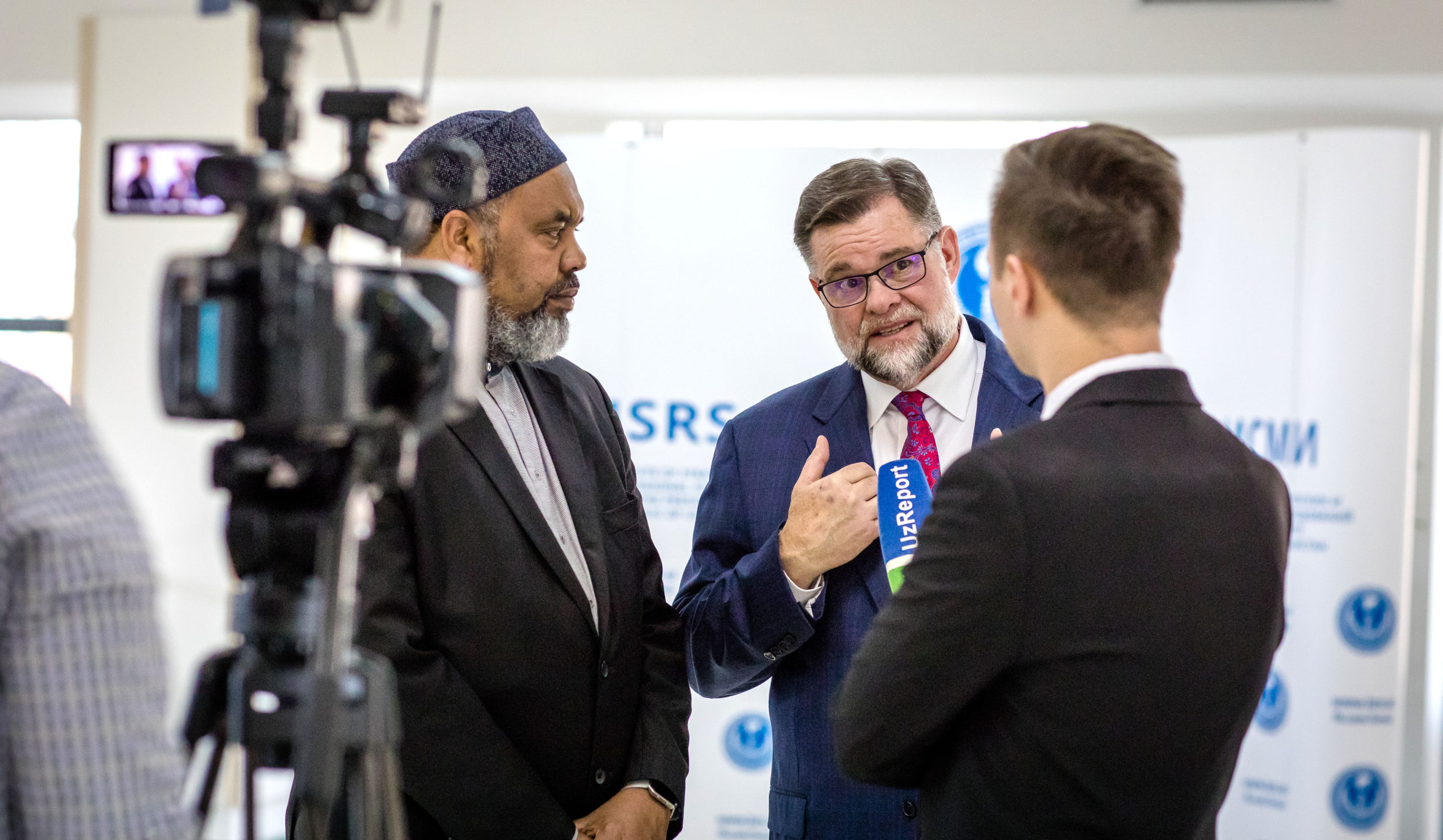
Pastor Bob Roberts, Jr., Imam Mohamed Magid, and Rabbi David Saperstein
What if religions built relationships through shared meals? What if religions stuck up for one another in a crisis? Pastor Bob Roberts, Jr., founder of GlocalNet and co-founder of Multi-Faith Neighbors Network (MFNN), is working with Imam Mohamed Magid and Rabbi David Saperstein to build resilient communities of mutual trust and respect among faith leaders through honest dialogue, authentic relationships, and civic engagement in an effort to build resilient cities around the world.
MFNN provides a platform for people to connect with God and one another by building empathy. Only then can one begin to relate to others who think differently, and thus find common ground. MFNN is intentionally multi-faith. It respects the fact that different religions have exclusivist beliefs about spiritual realities. It is not interested in anyone giving up their faith convictions. Instead, MFNN acknowledges differences in theology with respect. This respect enables people from various religions to work together.
Pastor Roberts, Imam Magid, and Rabbi Saperstein have partnered to create the MFNN program, a multi-faith experience to begin multi-faith dialogue. “Our goal is to get at least ten Pastors, ten Imams, and ten Rabbis [to join us],” says Roberts. Clerics begin by breaking off into smaller groups to talk through these questions.
After the small groups, a larger group conversation is facilitated around the idea of “questions you’ve always wanted to ask, but have been too afraid to.”
We’re living at a unique time in terms of multi-faith relations. There has never been a moment in human history that has seen anything like this modern phenomenon. There is no single problem in this world that a single religion will fix. And now that more faiths are represented in more regions, it’s imperative that their leaders and followers learn how to relate to one another despite their differences.
Religion is often blamed for many of the world’s conflicts. MFNN believes that people of different faiths can, and should, work together to serve their city and protect religious freedom for everyone – if only because everyone is a religious minority somewhere. Multi-faith relationships begin with the recognition of difference, while building deep bonds through what is held in common.

MFNN began as a way to build innovative relational bridges between faith communities in Roberts’s hometown of Dallas-Fort Worth, Texas. “[Imam Magid and I] came up with an idea to do an event between our church and the mosque. I said, ‘You and I may disagree, but there’s one this we can agree on: God’s happy tonight. Because we’re building a bridge that’s never been built here before,’” says Roberts.
MFNN encourages the multi-faith community to serve their city together, stand up for each other’s religious freedom, and respond to a crisis together.
Following the initial two-and-a-half day MFNN retreat, conversation, community building, and partnership continues in the following ways:
1. Sharing a Meal
Clerics open their homes to each other and break bread with one another. This allows a comfortable, familiar, and deeply personal space where these clerics can get to know each other.
2. Socializing as a Multi-Faith Community
Moving from engaging clerics to building bridges between faith communities is critical. Clerics involved in the program will host “mixers” at their individual places of worship for the other religious community members to attend, fostering a dialogue of multi-faith understanding and acceptance.
3. Participating in a Community Project Together
Many people talk about interfaith dialogue, but we aim to focus on multi-faith engagements. These shared experiences allow people of different faiths to work together toward a common good.
4. Standing Up for Each Other During a Crisis
MFNN is focused on creating longtime bonds that build community through religion, not in spite of it. Resilient cities are those that respect people who are different than themselves, respond to change easier, and are better prepared for unexpected events.
When pastors, say imams, rabbis, and other clerics and religious leaders come together to learn from each other, they become models for their own faith communities. By way of example, they remove fear and increase understanding within their own faith communities.
Multi-faith relationships allow everyone to hold onto their own beliefs while still building deep bonds with other faiths and serving their city together. Faith leaders can be a powerful, moral voice in society. Working cooperatively, they can model the very kind of society and world that all of us are trying to build – one where community, cooperation, and the common good are respected.

